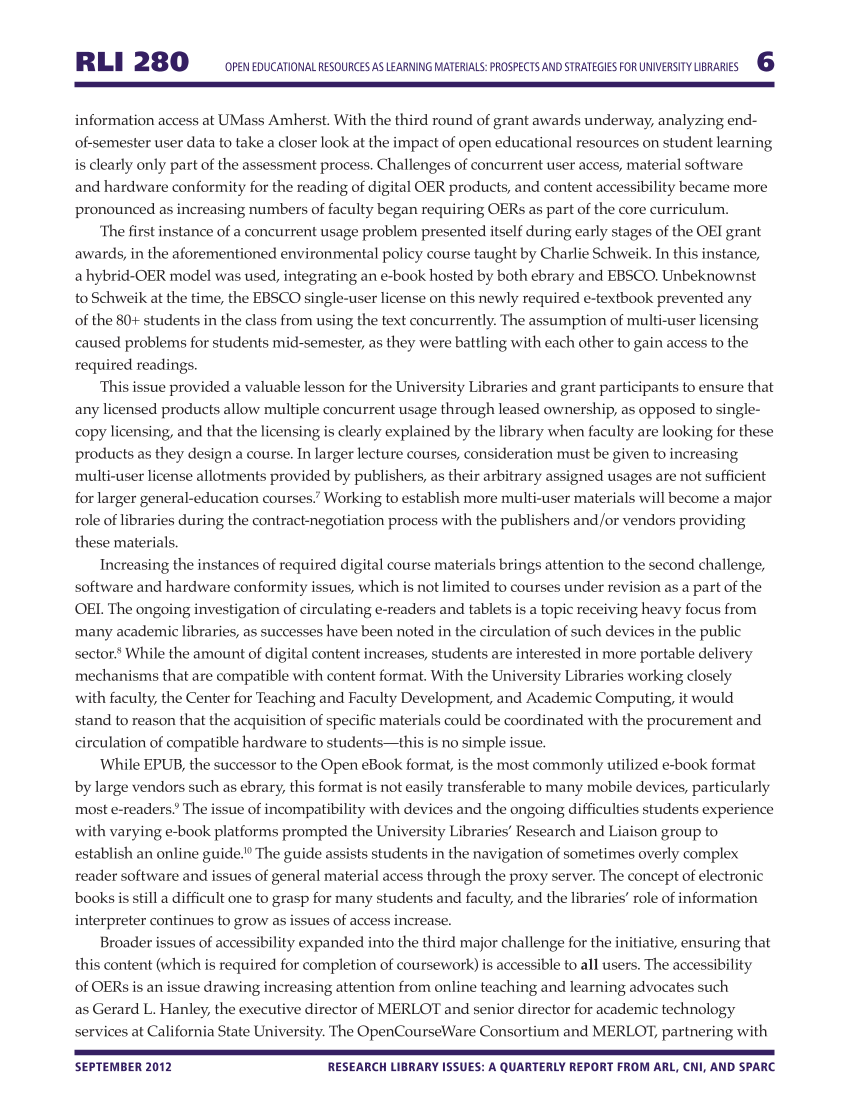RLI 280 Open Educational Resources as Learning Materials: ProOspects and Strategies for University Libraries 6 SEPTEMBER 2012 RESEARCH LIBRARY ISSUES: A QUARTERLY REPORT FROM ARL, CNI, AND SPARC information access at UMass Amherst. With the third round of grant awards underway, analyzing end- of-semester user data to take a closer look at the impact of open educational resources on student learning is clearly only part of the assessment process. Challenges of concurrent user access, material software and hardware conformity for the reading of digital OER products, and content accessibility became more pronounced as increasing numbers of faculty began requiring OERs as part of the core curriculum. The first instance of a concurrent usage problem presented itself during early stages of the OEI grant awards, in the aforementioned environmental policy course taught by Charlie Schweik. In this instance, a hybrid-OER model was used, integrating an e-book hosted by both ebrary and EBSCO. Unbeknownst to Schweik at the time, the EBSCO single-user license on this newly required e-textbook prevented any of the 80+ students in the class from using the text concurrently. The assumption of multi-user licensing caused problems for students mid-semester, as they were battling with each other to gain access to the required readings. This issue provided a valuable lesson for the University Libraries and grant participants to ensure that any licensed products allow multiple concurrent usage through leased ownership, as opposed to single- copy licensing, and that the licensing is clearly explained by the library when faculty are looking for these products as they design a course. In larger lecture courses, consideration must be given to increasing multi-user license allotments provided by publishers, as their arbitrary assigned usages are not sufficient for larger general-education courses.7 Working to establish more multi-user materials will become a major role of libraries during the contract-negotiation process with the publishers and/or vendors providing these materials. Increasing the instances of required digital course materials brings attention to the second challenge, software and hardware conformity issues, which is not limited to courses under revision as a part of the OEI. The ongoing investigation of circulating e-readers and tablets is a topic receiving heavy focus from many academic libraries, as successes have been noted in the circulation of such devices in the public sector.8 While the amount of digital content increases, students are interested in more portable delivery mechanisms that are compatible with content format. With the University Libraries working closely with faculty, the Center for Teaching and Faculty Development, and Academic Computing, it would stand to reason that the acquisition of specific materials could be coordinated with the procurement and circulation of compatible hardware to students—this is no simple issue. While EPUB, the successor to the Open eBook format, is the most commonly utilized e-book format by large vendors such as ebrary, this format is not easily transferable to many mobile devices, particularly most e-readers.9 The issue of incompatibility with devices and the ongoing difficulties students experience with varying e-book platforms prompted the University Libraries’ Research and Liaison group to establish an online guide.10 The guide assists students in the navigation of sometimes overly complex reader software and issues of general material access through the proxy server. The concept of electronic books is still a difficult one to grasp for many students and faculty, and the libraries’ role of information interpreter continues to grow as issues of access increase. Broader issues of accessibility expanded into the third major challenge for the initiative, ensuring that this content (which is required for completion of coursework) is accessible to all users. The accessibility of OERs is an issue drawing increasing attention from online teaching and learning advocates such as Gerard L. Hanley, the executive director of MERLOT and senior director for academic technology services at California State University. The OpenCourseWare Consortium and MERLOT, partnering with




























